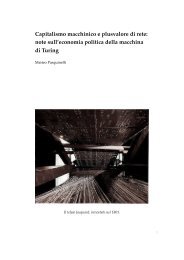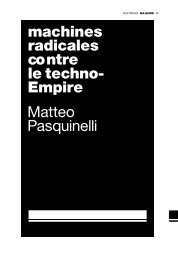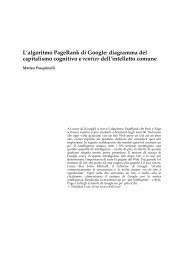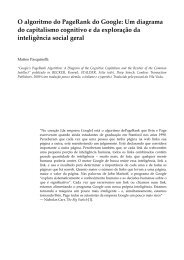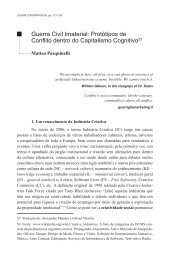Immaterial Civil War - Matteo Pasquinelli
Immaterial Civil War - Matteo Pasquinelli
Immaterial Civil War - Matteo Pasquinelli
You also want an ePaper? Increase the reach of your titles
YUMPU automatically turns print PDFs into web optimized ePapers that Google loves.
5. David Harvey and the collective symbolic capitalIf Tarde, Lazzarato and Rullani are useful for framing the competitive habitatof ideas (dissemination, imitation, competition, hegemony), David Harvey’sessay “The Art of Rent” 12 introduces a clearer description of the politicaldimension of symbolic production. He manages to link intangible productionand real money not through intellectual property but by tracking the parasiticexploitation of the immaterial domain by the material one.The key example is Barcelona, where there is the clearest connectionbetween real estate economy and the production of culture as social capital.The success of Barcelona as an international brand has been created by itscultural and social roots and is continuously fuelled today by a cosmopolitanand alternative culture: in fact, that collective product is exploited first andforemost by real estate speculators. The kinds of gentrification processes arewell known. Bottom-up: outsiders attract artists that attract gentry. Or, on thecontrary, top-down: open-minded and futuristic art institutions built in aghetto (like the MACBA in the Raval in Barcelona) raise rents and force peopleto move. However, Harvey wants to point out a more general process.Harvey applies the concept of monopoly rent to culture: “All rent isbased on the monopoly power of private owners of certain portions of theglobe.” There are two kinds of rent: you can exploit the unique quality of awine or you can see the vineyard producing that extraordinary wine. You canput a hotel in a very charming city, or selling the land where to put hotels likethat. Capitalism is always looking for marks of distinction. According toHarvey culture produces today the marks of distinction that capitalism canexploit selling material goods. On a city scale, real estate business is thebiggest business triggered by knowledge economy. Any immaterial space hasits material parasites. Think about files sharing and iPods.If the degree of dissemination makes the value of a cognitive product,as Rullani points out, Harvey put a limit to that valorisation. Disseminationthat goes too far can dissolve the marks of distinction into a mass product.There is an entropic ending in any idea after its hegemonic period. Harveyhighlights the first contradiction: the entropy of the marks of distinction:The contradiction here is that the more easily marketable such items becomethe less unique and special they appear. In some instances the marketing itselftends to destroy the unique qualities (particularly if these depend on qualitiessuch as wilderness, remoteness, the purity of some aesthetic experience, andthe like). More generally, to the degree that such items or events are easilymarketable (and subject to replication by forgeries, fakes, imitations orsimulacra) the less they provide a basis for monopoly rent. […] therefore,some way has to be found to keep some commodities or places unique andparticular enough (and I will later reflect on what this might mean) tomaintain a monopolistic edge in an otherwise commodified and often fiercelycompetitive economy.8



